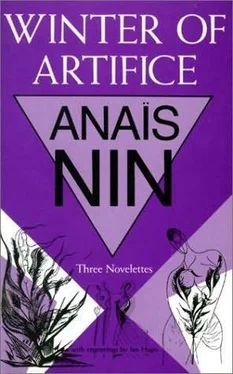Anaïs Nin - The Winter of Artifice
Здесь есть возможность читать онлайн «Anaïs Nin - The Winter of Artifice» весь текст электронной книги совершенно бесплатно (целиком полную версию без сокращений). В некоторых случаях можно слушать аудио, скачать через торрент в формате fb2 и присутствует краткое содержание. Год выпуска: 2007, Издательство: Sky Blue Press, Жанр: Классическая проза, на английском языке. Описание произведения, (предисловие) а так же отзывы посетителей доступны на портале библиотеки ЛибКат.
- Название:The Winter of Artifice
- Автор:
- Издательство:Sky Blue Press
- Жанр:
- Год:2007
- ISBN:нет данных
- Рейтинг книги:4 / 5. Голосов: 1
-
Избранное:Добавить в избранное
- Отзывы:
-
Ваша оценка:
- 80
- 1
- 2
- 3
- 4
- 5
The Winter of Artifice: краткое содержание, описание и аннотация
Предлагаем к чтению аннотацию, описание, краткое содержание или предисловие (зависит от того, что написал сам автор книги «The Winter of Artifice»). Если вы не нашли необходимую информацию о книге — напишите в комментариях, мы постараемся отыскать её.
“A handful of perfectly fold fables, and prose which is so daringly elaborate, so accurately timed… using words as magnificently colorful, evocative and imagist as any plastic combination on canvas but as mysteriously idiosyncratic as any abstract.”
—
The Winter of Artifice — читать онлайн бесплатно полную книгу (весь текст) целиком
Ниже представлен текст книги, разбитый по страницам. Система сохранения места последней прочитанной страницы, позволяет с удобством читать онлайн бесплатно книгу «The Winter of Artifice», без необходимости каждый раз заново искать на чём Вы остановились. Поставьте закладку, и сможете в любой момент перейти на страницу, на которой закончили чтение.
Интервал:
Закладка:
For “Djuna,” Nin wisely deleted the fifth and eighth sentences from the text of Henry and June . The first of them is unnecessary. In describing herself as “firm, wilful,” Djna adequately identifies masculine qualities, making “I was the man” redundant. There is also no good reason for retaining the eighth sentence. By this point in the novella, Djuna has characterized Johanna as unsophisticated, poor, and primal. Saying that this American who has spent little time in France is ignorant of French would seem unnecessarily critical. Further, having Johanna observe the shopkeeper’s nastiness would be inappropriate because Djuna implies the clerk’s rudeness in her direct statement to Johanna.
As Nin deleted sentences from the diary version of this scene when writing “Djuna,” shealso added sentences to it. In two new sentences beginning “Give me this, the best,” Djuna emphasizes the depth of her affection for Johanna, although the first sentence would have conveyed this emotion adequately. Another new sentence at the end of the paragraph makes Djuna’s point obvious: “I love you, Johanna.” The additions strike me as redundant.
A beneficial change in this paragraph concerns the woman who waits on the customers. In the earlier version, she is one of at least two shopkeepers; in the later, she is the only shopkeeper. Making her the sole person involved with Djuna and Johanna eliminates an extraneous person or people, thereby sharpening focus.
Comparing this one paragraph in Henry and June and its revision in “Djuna” supports Nin’s claim that in writing The Winter of Artifice Nin “transpose[d]” material from her diary. [12]Whether her use of the diary in the service of fiction was “naively exaggerated,” though, depends on what she means by this phrase. If her comment to Pollak means that she failed adequately to transform occasional episodes from the diary for use in The Winter of Artifice,she might be correct, although she did modify them, sometimes effectively. She errs, though, in telling Pollak that she first used the diary for fictional purposes in The Winter of Artifice . It serves as a basis for characters and events in The House of Incest (1936) and in some of her short fiction published before 1939.
Whatever the reasons for Nin’s dissatisfaction with the collection of novellas published in Paris, she revised it substantively for publication as Winter of Artifice in 1942. The later edition includes only two novellas: one without title that had been “Lilith,” and “The Voice.” [13]Other than omitting “Djuna,” an altered point of view is the most important revision. In The Winter of Artifice , the first two novellas are told in the first person; the last, in the third. The two novellas in the revised edition are told in the third person, thereby creating narrative unity between these texts that concern Lilith prominently, though she is unnamed in the first one. The adjusted point of view also helps increase certainty. In the 1939 edition, narrator Lilith occasionally thinks she knows what another character means; in the 1942 text, the third-person narrator is certain. In the Paris edition, for example, Lilith interprets her father’s initial comments to her: “It seemed to me that his first words were words of apology” (Nin 1939, 123). Revised, the father’s meaning is unambiguous: “His first words were words of apology” (Nin 1942, 18). The difference matters, though Nin could have made Lilith’s statement definite had she changed it within Lilith’s own narrative.
Nin made other modifications to “Lilith.” Sometimes, individual words, sentences, and even paragraphs of the 1939 edition are omitted from the 1942 text. Here is a paragraph that appears only in the earlier edition, wherein Lilith refers to her experiences during the decades she was separated from her father:
It was this absorption in the need of the other which was at the root of all the mysteries of my life — at the root of my silences, my evasions, my lies. A sensitiveness to what my father did not want to hear prevented me even from picturing the scenes I had enjoyed. I was perpetually recomposing the scene in such a way that it would bring a balm to his egoism, a lull to his jealousy. (Nin 1939, 138)
Nothing of which I am aware indicates why Nin excluded this paragraph from the revised text. She possibly did so because it relates too much, especially in the first sentence, where Lilith conveys her understanding of the reason for her problems. Perhaps Nin realized that letting a character’s actions reveal emotional realities is generally preferable to explaining them.
Nin altered significantly the 1939 version of “The Voice” before publishing the novella in 1942. She removed every mention of Hans, which necessitated deleting passages as long as two pages. Other deletions indicate that she was aware of American censors or of the presumably delicate sensibilities of American readers, or both. Among the material present in the Paris edition but absent from the later one: the scene in which Lilith bares her breasts to the Voice (Nin 1939, 238-39), a passage dealing with an erection (244-45), Lilith’s menage a trois with Harold and Arline and later the two women’s sexual encounter (248-51), Lilith’s calling Djuna a bitch (254), and Djuna’s reference to her and Lilith’s menstrual periods (255). Nin also deleted material relating to Georgia and Mischa, as well as the entire scene of Lilith and the Voice vacationing. Further, Nin omitted less dramatic material, occasionally at the end of paragraphs, possibly because it is redundant. She tightened prose, as when describing Lilith’s response to the Voice’s statement that “a real woman” cannot successfully live life alone: “I must have become a real woman right here, for I feel the dependence now, and I don’t mind it. I like it” (276) becomes “I don’t mind my dependence on your interpretations” (Nin 1942, 139).
In sum, Nin made many changes to The Winter of Artifice before publishing two of the novellas in Winter of Artifice . The nature of the alterations indicates that Nin matured as a writer between the first two editions of her collection of novellas.
I have explained reasons for Nin’s dissatisfaction with The Winter of Artifice . As Nin acknowledges, it shows the influence of Henry Miller. Even with his assistance, however, she did not create polished fiction. Perhaps the flaws of the 1939 edition are understandable. Nin — an author admittedly not then fully rom the rtable with English — was writing in a form that was new to her: relatively long, relatively realistic fiction. Each novella is much longer and more realistic than her first volume of fiction, The House of Incest , a prose-poem of slight plot and externally ill-defined characters. Yet Nin’s accomplishment in The Winter of Artifice is important. Within imperfect plots substantial enough to hold readers’ attention, Nin effectively examines the emotional difficulties of Djuna, Lilith, and the Voice, precisely as she addresses similar problems with the major characters in the five novels beginning with Ladders to Fire (1946). The Winter of Artifice also illustrates the manner in which Nin adapted diary material for fictional purposes. Further, her revisions of “Lilith” and “The Voice” serve as a basis for documenting her maturation as a writer between the 1939 publication of the book and the appearance of the revised edition only three years later.
The Winter of Artifice is Nin’s most neglected book because from almost immediately after its publication until now it has been unavailable and therefore unknown. After its only reviews (one in 1939, another in 1940), it received no critical comment of which I am aware. Even Nin’s two major biographers, Deirdre Bair and Noel Riley Fitch, mention it only in passing. Some Nin scholars, such as Rose Marie Cutting, assume that all its editions are identical. For literary and scholarly reasons, then, this republication of The Winter of Artifice , two-thirds of a century after its first appearance, satisfies the greatest need relating to Nin’s fiction.
Читать дальшеИнтервал:
Закладка:
Похожие книги на «The Winter of Artifice»
Представляем Вашему вниманию похожие книги на «The Winter of Artifice» списком для выбора. Мы отобрали схожую по названию и смыслу литературу в надежде предоставить читателям больше вариантов отыскать новые, интересные, ещё непрочитанные произведения.
Обсуждение, отзывы о книге «The Winter of Artifice» и просто собственные мнения читателей. Оставьте ваши комментарии, напишите, что Вы думаете о произведении, его смысле или главных героях. Укажите что конкретно понравилось, а что нет, и почему Вы так считаете.











